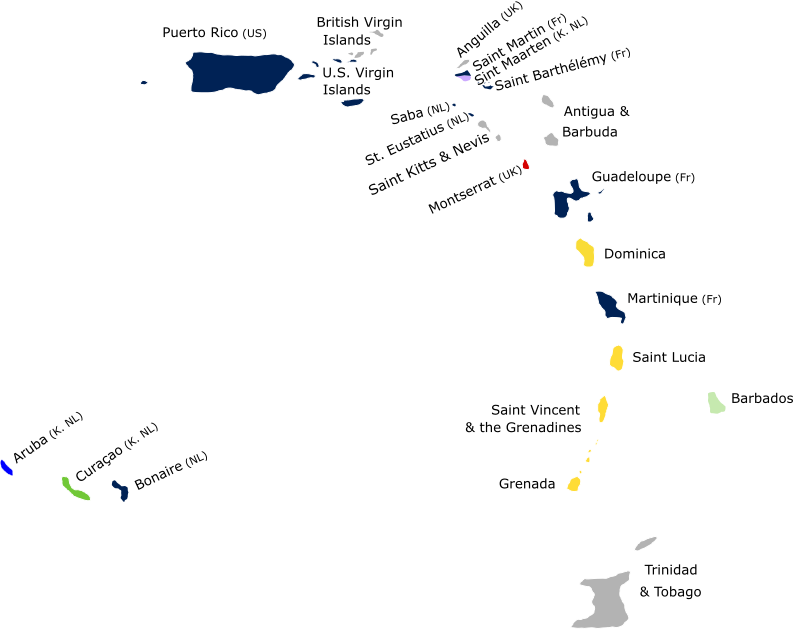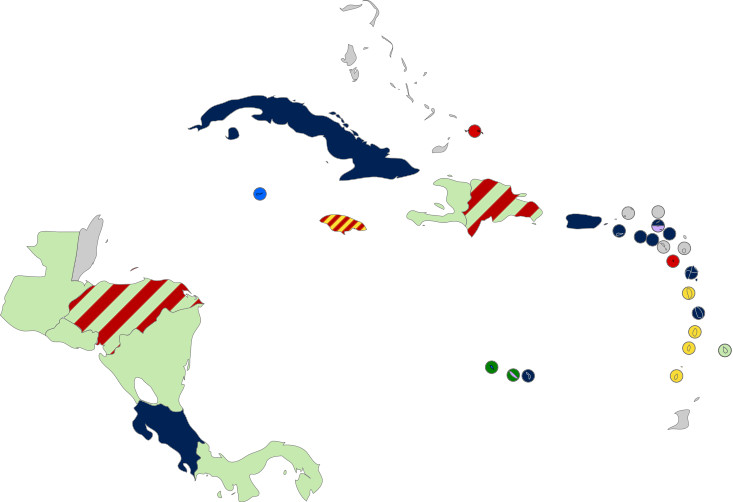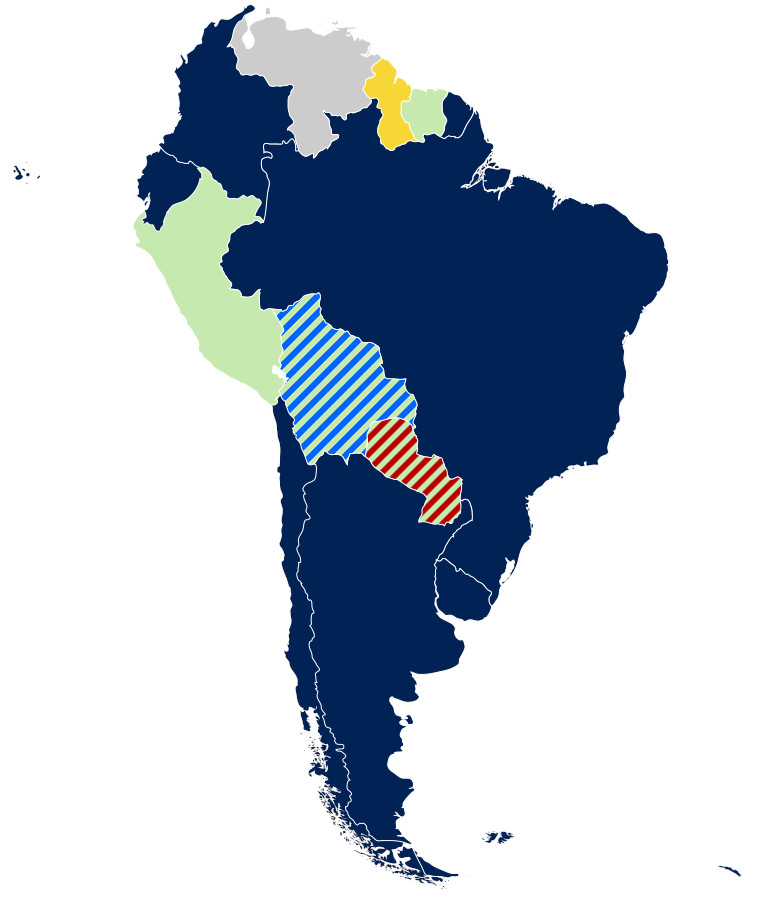2023 World Same-Sex Marriage and LGBT Rights Progress – Part 2: Latin America and Caribbean
Earlier in this series – Part 1: North America
Latin American and the Caribbean didn’t see quite the dynamic changes that came in 2022, when three countries decriminalized gay sex and one legalized same-sex marriage.
But there were many important smaller developments, and the region is poised to make some big gains for LGBT equality in 2024.
Caribbean

DARK BLUE: Same-sex marriage legal.
BLUE: Same-sex civil unions legal. MAUVE: Certain foreign same-sex marriages recognized.
DARK GREEN: Binding court ruling allowing same-sex marriage, but not yet in effect.
LIGHT GREEN: Country subject to 2018 IACHR ruling for same-sex marriage, but not yet in effect.
RED: Constitution bans same-sex marriage.
YELLOW: Sodomy illegal; court challenge pending. GREY: Sodomy legal, but same-sex marriage not permitted.
Jamaica: A case seeking to overturn the country’s sodomy laws ground to a halt when the Supreme Court ruled that the challenge was inadmissible as the laws are shielded from constitutional challenges by the “savings clause,” which protects pre-independence laws.
We thought that was the end of the fight, but last week, the plaintiff announced he will appeal that decision to the UK Privy Council, which is still Jamaica’s highest court. There’s no telling how the court will rule on this case, but the best case scenario is the court determines that the laws are not shielded (as the plaintiff contends, Jamaica has since amended the laws, rendering them new and not shielded). That would still leave the substance of the case to be tried in Jamaica. It’ll likely be years before the case is heard.
Court challenges to sodomy laws in Grenada, St. Vincent and the Grenadines, St. Lucia, and Dominica are still pending decisions. Given that these cases are all more than a year old at this point, and that they share the same Eastern Caribbean Supreme Court that struck down sodomy laws in Antigua and Barbuda and Saint Kitts and Nevis last year, I expect positive decisions rather soon in 2024 from all of them.
Trinidad and Tobago: The 2018 court decision that decriminalized gay sex is being appealed by the government, so the fight isn’t over here either. As of December, the Court of Appeal has not yet issued its ruling in the case. However it rules, the government and the plaintiff have both vowed to pursue the case to the UK Privy Council, so it will be years before this case is resolved. The issues are ultimately similar to the Jamaican case, so the Privy Council’s decisions there may be a guide to how they might rule in this case — although the government’s case is quite a bit weaker here as the change to the buggery law was much bigger in Trinidad than it was in Jamaica. Basically, if the Privy Council rules that Jamaica’s law is not saved by the Constitution, Trinidad’s Appeal is toast. But if it rules that Jamaica’s law is saved, there’s still scope to find that Trinidad’s is not saved.
Not holding back, the plaintiff at the center of the case says he plans to pursue challenges to all of the state’s homophobic laws, including the marriage law. Trinidad and Tobago also has a slew of discriminatory laws on the books, including an immigration law that supposedly bars “homosexuals” from entering the country.
Barbados: Last year’s decision decriminalizing sodomy was finally published in May, and in addition to ending the sodomy law, it made it clear that the court found that discrimination based on sexual orientation was prohibited under the constitution.
Cuba: Parliament updated the employment discrimination law to ban discrimination on the basis of gender identity.
UK Territories: While a case seeking the right to same-sex marriage is still before the British Virgin Islands’ court, the Premier continued to insist that a bill to hold a referendum on same-sex marriage or civil unions would be forthcoming, but it hasn’t in the year and a half since he first floated the idea. Apparently, Cabinet has already discussed the referendum bill though.
Various UK legislators have floated the idea of passing a law that would require the remaining holdout overseas territories – all in the Western Hemisphere – to legalize same-sex marriage. They would be Bermuda, Cayman Islands, Anguilla, Turks and Caicos, and Montserrat. The territories very much do not like the idea, but the odds of such a bill passing are slim, particularly this year. If anything, perhaps an incoming Labor government might pass an Order-in-Council requiring civil unions in all remaining territories, as they did with decriminalizing sodomy in 2000. Bermuda and Cayman Islands both allow same-sex civil unions.
Meanwhile, the queer activists in Bermuda have decided that the Privy Council’s ruling against same-sex marriage last year is not the final word on the issue. They’re taking their case to the European Court of Human Rights, and the Court agreed to hear the case this year. The Court has previously ruled that the Convention did not protect the right to same-sex marriage, but the Court has also gradually been expanding relationship rights. It can’t be a coincidence that this is occurring as the proportion of equal marriage states that are party to the convention keeps increasing – of the 46 members, 21 allow same-sex marriage, and another 9 allow civil unions. Bermuda’s next election is scheduled for 2026; the opposition has come out softly in favor of equal marriage.
Dutch Territories: The Court of Cassation for the Kingdom of the Netherlands is expected to rule on May 31 on an appeal from Aruba and Curacao over a same-sex marriage ruling from their joint local court. The government of the Netherlands has already indicated its preference is for legal same-sex marriage throughout the Kingdom, and it’s possible – though unlikely – that these countries will legalize it in advance of the ruling. The ruling doesn’t directly affect Sint Maarten, the other Dutch country, but logically a constitutional ruling ought to bind it too.
Central America

DARK BLUE: Same-sex marriage legal.
BLUE: Same-sex civil unions legal. MAUVE: Certain foreign same-sex marriages recognized.
DARK GREEN: Binding court ruling allowing same-sex marriage, but not yet in effect.
LIGHT GREEN: Country subject to 2018 IACHR ruling for same-sex marriage, but not yet in effect.
RED: Constitution bans same-sex marriage.
YELLOW: Sodomy illegal; court challenge pending. GREY: Sodomy legal, but same-sex marriage not permitted.
El Salvador: Nothing new to report here. Legislators continued to ignore last year’s order by the Constitutional Court to pass a law allowing trans people to change their legal name and gender.
Guatemala: Nothing explicit to report here, although voters did elect a reformist to the presidency, and he’s pledged to help restore democracy and fight corruption. Naturally, the ruling elites are working to keep Arevalo from actually assuming power, so we’ll see if he actually takes office in an orderly transition on 14 January. Regardless, the overall political atmosphere in Guatemala remains conservative on LGBT issues.
Honduras: The UN criticized the lack of action to stop violence against LGBT people in Honduras in May. The National Congress passed a law on sex education, which President Castro vetoed because it was insufficiently comprehensive with regard to ways to prevent teenage pregnancies.
Panama: In February, the Supreme Court finally delivered a long-delayed ruling in the same-sex marriage case first filed in 2016. The decision, which is frankly legal gibberish, denied that there was any right to same-sex marriage, specifically denying previous rulings from the Inter-American Court of Human Rights establishing that member states are obligated to legalize same-sex marriage. The Organization of American States called on Panama to legalize same-sex marriage in the wake of the ruling.
Costa Rica: A bill was introduced to recognize trans, nonbinary, and intersex people, and to ban unnecessary surgeries on intersex children. It’s still under discussion.
South America

DARK BLUE: Same-sex marriage legal.
BLUE: Same-sex civil unions legal.
LIGHT GREEN: Country subject to 2018 IACHR ruling for same-sex marriage, but not yet in effect; note Suriname and Peru courts have rejected the IACHR ruling.
RED: Constitution bans same-sex marriage.
YELLOW: Sodomy illegal. GREY: Sodomy legal, but same-sex marriage not permitted.
Bolivia: The machinery of government took steps this year to formalize the existence of same-sex civil unions (or “free unions” as they’re called here), following a court ruling that opened them up last year 2022. By July, the government had amended regulations to allow them at all civil registry offices. The free unions are legally equivalent in all but name to marriage, including with regard to adoption and parenting.
Colombia: A bill to ban conversion therapy was approved at first reading this summer and remains waiting final approval. The government also introduced a bill to ban employment discrimination based on sexual orientation or gender identity.
Venezuela: LGBT activists staged a major demonstration calling for advancement on a number of key rights issues, but ultimately only secured one victory: the Supreme Electoral Tribunal ruled that the ban on gay sex in the military was unconstitutionally vague. The activists had also called for equal marriage and right to change legal gender.
Venezuela heads into an election this year, and there had been hopes that it would be free and fair. However, current dictator Nicolas Maduro has already jailed his main opposition on trumped-up charges and is fomenting war with neighboring Guyana. So….
Guyana: Guyana remains the only country in the Western Hemisphere that has a sodomy law that is not subject to an active court challenge. We’ll see if that changes – or if Guyana even continues to exist – in 2024. The major local LGBT advocacy group started a campaign this year to raise awareness of LGBT people and to pressure the government to repeal the law.
Suriname: In February, the Constitutional Court ruled against same-sex marriage, ruling that the ban on same-sex marriage did not violate the constitution or Suriname’s obligations under the Inter-American Convention. Again, the decision is just nonsense.
Peru: The Constitutional Court ordered the national registry to register a same-sex marriage that occurred in Argentina, although the decision was limited to just the one couple. A civil union bill was introduced in Parliament, but it hasn’t advanced. A court in Cuzco also granted a legal gender change without surgery.
Chile: The leftist government introduced a few important regulatory reforms this year, including equal access to parental leave for same-sex parents, a ban on unnecessary surgeries for intersex children, and a ban on medical professionals performing conversion therapy.
In December, Chilean voters rejected a new draft constitution prepared by a committee of conservative legislators, which critics said was too right-wing and would limit rights for women, minorities, and queer people.
Brazil: A court found that homophobic slurs were covered under existing hate speech laws this year. The federal government also announced that it would permit asylum claims based on persecution of LGBTQ people.
A bill to criminalize conversion therapy was introduced in the Brasilia district legislature, but has not advanced, as far as I can tell. Conversion therapy is already banned for medical professionals nationwide.
Amazonas’ state legislature passed a law prohibiting children and adolescents from participating in the annual LGBT Pride festival. Similar laws have been proposed in other states.
Argentina: The big development was the election of “anarcho-capitalist” Javier Milei as President in November. While Milei is not exactly LGBT-friendly, he’s so far seemed to regard the community with a malign indifference rather than hostility, but it’ll be worth keeping an eye on developments here.





